David Dubrow's Blog, page 19
October 10, 2017
Book Review: Quiet Places
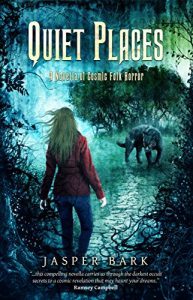 I reviewed Jasper Bark’s horror novella Quiet Places at The Slaughtered Bird:
I reviewed Jasper Bark’s horror novella Quiet Places at The Slaughtered Bird:
Billed as “cosmic folk horror”, a classification of genre fiction heretofore reserved for this book alone, so far as I can tell, Quiet Places tells the story of Sally, her lover David, and the Scottish town of Dunballan. First and foremost it’s a tale of secrets, from Sally’s unusual past to David’s family history to Dunballan’s disturbing past, present, and future. Full of hidden depths, the novel takes on a bizarre form of storytelling: flashbacks predicated on diary entries unearthed from the secret history of the world…
Is this another top-shelf horror story from a modern master, or did this book miss the mark? Read the whole thing to find out!







October 3, 2017
5 Things You Need to Know About the Las Vegas Shooting
A number of facts have been lost in the wake of the Las Vegas shooting, so I’m going to list them here.
We all have unfortunate or unworthy thoughts after horrific crimes like this, but people with the kind of ethics that normal Americans would want their children to emulate never voice them in the public square. Social media has, unfortunately, provided us with a loudspeaker that is tailor-made to broadcast these unworthy thoughts, and the least decent of us have taken the opportunity to do just that. If you view mass murders through a pre-determined political lens, whether it’s gun control, anti-NRA sentiment, or race/ideology-based animus toward the victims, there’s something desperately, deeply wrong with you. Your insistence on politicizing a massacre absent facts displays de facto indifference to the suffering of the victims and their families.
While you may have license to express your opinion, your ignorance of gun handling, gun laws, gun culture, the Second Amendment to the U.S. Constitution, and the particulars of this case don’t guarantee that you or your opinion will be taken seriously by people of substance. Emotionalism doesn’t equal credibility, no matter how strongly you feel.
You can’t counter emotion with facts, no matter how hard you try. It’s stupid to make the attempt. To paraphrase one of my favorite expressions, “You can’t reason someone out of a position he hasn’t reasoned himself into.” Ridicule is the only answer to politically-motivated emotional appeals, and it must be applied without mercy.
Your blistering hot take, tweeted at 140 characters (more or less) is unbelievably stupid, unnecessary, and without the slightest value whatsoever. Most of the time you don’t know what you’re talking about, and even if you do in this case, you’re the noise in the signal-to-noise ratio. Your snark is only welcomed by your fans. Everyone else thinks you’re disgusting.
More talking to each other won’t heal America’s internal division. Fueled by a hostile media culture and exacerbated by the easy anonymity of social media, we’re as divided as we can get absent a real-live civil war. Hell is, unfortunately, other people. We’ve talked to each other enough, and we’ve found that we just don’t get along. It wasn’t long ago that we could disagree without one side trying to destroy the other, but those times have faded into memory.
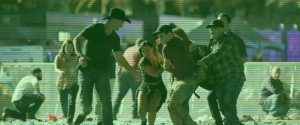
Donate blood. Donate money. Reach out to a friend. Hug your kids. Pray. Volunteer.







September 29, 2017
Movie Review: 3
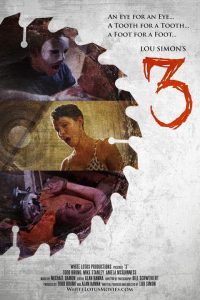 I reviewed the horror film 3 at The Slaughtered Bird:
I reviewed the horror film 3 at The Slaughtered Bird:
It begins with an interesting premise: a rapist is lured to a remote cabin in the woods, knocked unconscious, and tortured until he confesses to the crime. The brief, numerical title appears to refer to the three main characters, known only as He (the torturer), She (the rape victim), and It (the rapist). However, as the film unfolds, the meaning of the title and the significance of each character alter in ways that I can’t describe for fear of spoiling it.
Is it good, bad, or indifferent? Only one way to find out!







September 27, 2017
Book Review: Dark Gold by David Angsten
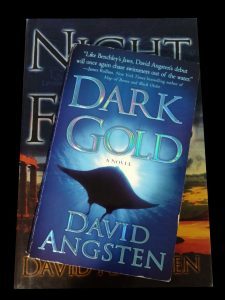 I named David Angsten’s thriller Dark Gold one of my favorite reads of 2016, but I wanted to tell you why in more detail.
I named David Angsten’s thriller Dark Gold one of my favorite reads of 2016, but I wanted to tell you why in more detail.
Dark Gold is a timeless, multi-layered thriller that transcends the genre, a novel that’s as relevant today as it was when it was published in 2006 because it focuses on themes that we can all relate to: friendship, family, betrayal, and greed. Told in first person by Jack Duran, a somewhat directionless, untried young man who’s just graduated college, it describes his quest to find his missing brother Dan, and the terrible things Jack uncovers along the way.
It’s very much a hero’s journey that takes the reader to Mexico and beyond, filled with cocaine pinatas, bizarre rituals, shocking violence, sunken treasure, and El Diablo Blanco, a creature as disturbing as anything you would see outside the mind of H.P. Lovecraft. From the details of drug culture and deep-sea diving to characters that don’t just leap off the page, but get into your face and demand you never forget them, Dark Gold is the fastest-reading novel for its length I’ve ever encountered.
Danger, sex, untold riches, and horrific cults: what’s not to like? Escapism doesn’t get much better than Dark Gold.







September 21, 2017
Interview With Nev Murray
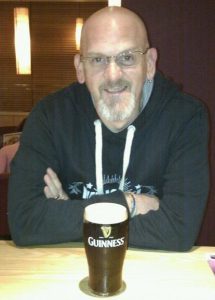 I interviewed Nev Murray, proprietor of the awesome site Confessions of a Reviewer at The Slaughtered Bird:
I interviewed Nev Murray, proprietor of the awesome site Confessions of a Reviewer at The Slaughtered Bird:
What’s your favorite type of horror? Do you have a least favorite?
What I really like depends on my mood a lot of the time. With reading so many books, it can get a bit monotonous if the plot seems to be more or less the same as one I have recently read so I tend to vary the type a lot. I don’t like extreme horror, the ones with the black covers especially. I don’t think it takes a lot of writing skill to create something that is so extreme it is perverse. I think it is more beneficial, and scary, for the reader to be teased to a point where their own imagination takes over and fills in the blanks. I also despise sex in horror books. If I was in a position where I knew there was something outside my house that was coming for me, the last thing I would think of is getting jiggy with my wife. I’d be running for the hills.
My favourite? Easy. I am a sucker for Victorian and Edwardian horror. William Hope Hodgson is a hero of mine. His Carnacki stories are just amazing. He was a writer that was way before his time. If he were about today, he would be a bestseller all over the world.
Many have tried to copy his style and many have failed. Those that nail it would be the likes of William Meikle and Jack Rollins. When it is written right, it is immense. It’s the whole idea of not having technological advances to defeat the evil that gets me. I love it.
There’s a lot of great stuff in there, so click and get reading!







September 19, 2017
Calliope, Irma, and Me
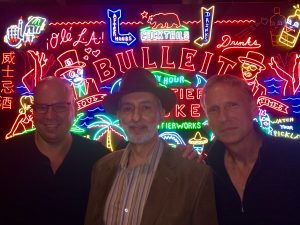 David Dubrow, Robert Bidinotto, David Angsten
David Dubrow, Robert Bidinotto, David AngstenA couple of months ago I received an invitation to mentor some novelists at the Calliope Workshop for Fiction and Nonfiction Authors, hosted at the offices of Taliesin Nexus in Los Angeles, California. In addition to paying me for my work, the Calliope Workshop would also fly me out and put me up at a hotel in downtown L.A. Deeply honored, I accepted.
As the weeks flew by and I received manuscripts from the writers I would mentor, the specter of Hurricane Irma rose in the Caribbean, heading straight for my home state of Florida. Every day I checked the projected paths, spaghetti models, and weather forecasts, all of which said the same thing: Irma was coming, and if I attended the workshop, I would be leaving my wife and son to face the storm alone. Despite this, Mrs Dubrow, who is easily the most capable person I know, insisted I go.
So, heart in my mouth, I went.
We had been preparing for such a storm for years: our house is situated in a non-evacuation zone, which means that it’s the sort of place you want to evacuate to if there’s any risk of flooding. We had landscaped in such a way as to minimize the danger of trees crashing through the roof (trees on our property, anyway), and we had acquired plenty of water and food if everything went to pot. And, best of all, we live close to a hurricane shelter in case the gale drives our neighbors’ tree limbs through our windows. While it’s impossible to prep for every contingency, we were ready.
And yet, I worried.
As for the workshop, it was a transformative experience. There’s nothing like teaching others the fundamentals to keep you yourself learning, and in between mentoring sessions, a number of brilliant and successful writers gave panel discussions, like Adam Bellow, Robert Bidinotto, Ann Bridges, Nick Cole, Andrew Klavan, and Ken Lizzi. David Bernstein of Liberty Island led a discussion on marketing and sales. Michael Walsh was the keynote speaker. Best of all, I met my friend David Angsten face to face at long last; David, another panelist, recommended me for this gig, and he’s one of those rare people you like more and more the better you know him. I was also privileged to meet Andrew Malcolm of Hot Air, as well as some other columnists whose material I had read and enjoyed over the years.
Irma hung over everything. In the layover between connecting flights to California, the airline canceled my flight home, days in advance. The hurricane was scheduled to hit the west coast of Florida late Sunday night, and all models projected it to rampage over my very neighborhood in its path along the state. I was helpless to do anything but worry and pray, like most Floridians, but I was the one who fled and left his family behind (a silly thought, but it’s one of the things that occupies one’s mind in anxious moments). Because I didn’t know when I might be able to get home again, I arranged to fly to Philadelphia, Pennsylvania, figuring I’d stay with my older brother and his family until I could catch the next flight to Tampa. I spent Sunday night in an agony of worry until I heard from my wife, who told me that the electricity had gone out but everyone was fine.
Imagine my relief.
Once the storm drifted north, the airport opened again. The earliest flight I could get would take me halfway across the country to Dallas, Texas. Then, after a four-hour layover, from Dallas to Tampa. Not fun, but compared to what people in the Florida Keys and the Caribbean were going through, it was nothing. First-world problems. During that time, my wife and son checked into a hotel near the airport, because it’s next to impossible to live without air conditioning in Florida. My Dallas to Tampa flight was delayed four more hours, and I wasn’t reunited with my family until four o’clock in the morning that Friday.
Three days later (eight days after the storm blew out our power), electricity was restored to my house. We were among the last in the county to get power back. For us, the disaster was over.
As the things I learned, saw, and did in L.A. sort themselves into the various corners of my mind, I find myself overwhelmed by gratitude.
Thanks to God for sparing my family. Others weren’t so fortunate.
Thanks to the Calliope Workshop for putting such faith in me.
Thanks to David Angsten for recommending me for the job.
Thanks to my brother and his family, who took me in.
And last but definitely not least, thanks to Mrs Dubrow, who could’ve asked me to stay behind, but didn’t.







September 13, 2017
Coming Home: Two Stories
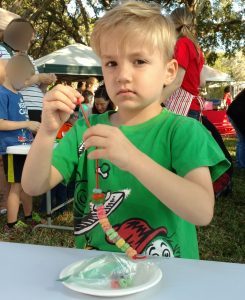 When we moved to Florida, my wife and son went first so I could pack up the house, take care of all the moving arrangements, oversee home repairs, deal with landscaping improvements, etc. They stayed with her parents while I remained in Colorado for a week and a half. My son was about 14 months old at the time, so he was still in his babyhood, moving to toddlerhood (which isn’t really a word). This is one of the reasons why parents refer to their young children’s ages in months: you expect different things from an 8-month-old than an 18-month-old. It makes more sense when it’s personally relevant, like so much else in parenting.
When we moved to Florida, my wife and son went first so I could pack up the house, take care of all the moving arrangements, oversee home repairs, deal with landscaping improvements, etc. They stayed with her parents while I remained in Colorado for a week and a half. My son was about 14 months old at the time, so he was still in his babyhood, moving to toddlerhood (which isn’t really a word). This is one of the reasons why parents refer to their young children’s ages in months: you expect different things from an 8-month-old than an 18-month-old. It makes more sense when it’s personally relevant, like so much else in parenting.
Boxes filled, movers tipped, and all other arrangements made, I drove our SUV to Florida from Colorado, which was rather a long, solitary trip. This took place during Tropical Storm Debbie, which lashed the southeast with torrential rain and wind. After the grueling drive, with an aching back and no sleep and the yearning for family that you experience when you’ve been away for too long, I got to my in-laws’ house very early in the morning. My wife had already left for work, so I went to the guest room where my son lay in his Pack-and-Play (his crib was still in a moving truck somewhere), and I was so happy to see him that I couldn’t speak.
My son, at the time, couldn’t have cared less. He wanted his toys, his breakfast, to be not picked up and cuddled by his father. He cried until I put him down. God, it hurt. I kind of expected it, because he was too young to be aware of the passage of time, but it hurt all the same. I missed him and he didn’t miss me. Some homecoming.
—
I think it was a year or so later when my wife and I went on a long vacation to some resort or other. (A long vacation by my definition is anything more than three days. Vacations always discomfit me, just a little. I know it’s weird.) We left our son with her parents and did the typical laze-around things one does at an all-inclusive resort: swam in the pool, ate a lot, drank a lot, hung out on the beach, read books, etc. When we got back to my in-laws’, it was around time to wake up our son from his afternoon nap. This is something I remember as clear as I can recall what I had for breakfast today: I went into the darkened bedroom, and there he was in the Pack-and-Play bed. Roused from sleep by the sound of the door opening, my son stood up, with his blond hair all tangled and his striped romper creased, and he saw me, and he smiled, and he said, simply, “Daddy.”
And the wound that he had unknowingly opened in me a year before was healed.
Parenthood is full of these injuries. Some of them heal, some just scab over. It may be that God intended for us to be younger when we’re parents, because it teaches us to be better children while our parents are still alive. I wish I had been a better son, and I try every day to be a good father.
—
A prior engagement, the details of which I will relate in a future post, kept me away from home when Hurricane Irma struck, and has stranded me for much longer than anyone would like. Pleasantly, my family and house are both in good shape, which is all I can ask for and more than I deserve. I’ll be home soon.
I can’t wait.







September 7, 2017
Book Review: The Space Vampires
Horror fans mourned the passing of legendary director , who directed The Texas Chain Saw Massacre, Poltergeist, and other films. I never much cared for the TCM movies; they mostly consist of running, brutality, blood, and tears. And Poltergeist spawned a terrible sequel, not to mention a wholly unnecessary remake. Despite my quibbles about his most famous franchises, Hooper did direct one of my favorite movies of all time: Lifeforce.
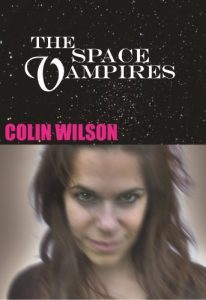 A novel-length book could be written about the departure that the film Lifeforce took from its source material, Colin Wilson’s novel The Space Vampires, but I won’t do that here. Wilson himself loathed the movie, with good reason. So the two cannot be compared.
A novel-length book could be written about the departure that the film Lifeforce took from its source material, Colin Wilson’s novel The Space Vampires, but I won’t do that here. Wilson himself loathed the movie, with good reason. So the two cannot be compared.
The Space Vampires, written in 1976, posits a bizarre first-contact scenario: in the 22nd Century, the Space Research Institute’s spacecraft Hermes, captained by Olof Carlsen, finds a gigantic, derelict space ship floating in space. They take some of the human-looking, though apparently dead aliens back to Earth with them, and as it turns out, the aliens are actually body-switching vampires that eat life-energy (life force, if you will). This presents a significant problem, particularly because there are plans to haul the gigantic space ship back to Earth for deeper study.
This is a very talky sort of novel, where the characters discuss the science of life energy and how it can be manipulated at great length. In this respect it’s almost like a police procedural, as Carlsen, once he returns to Earth, joins famous scientist Hans Fallada on a Europe-spanning quest to learn more about these aliens and how to stop them. What’s clear is that the author, an occultist himself, was using this novel as a vehicle to advance this idea of manipulable life energy: how some people just seem to suck the life out of a room, the energy-exchanging relationship of masochists to sadists, and mental illness as it relates to life force. As a firm believer in the scientific method, I didn’t find Wilson’s ideas to be credible, though they were fascinating to read.
Parts of the novel read like a Sherlock Holmes mystery in that there’s great emphasis on brandy, whiskey, and sandwiches. I rather liked that part; it set the book very firmly in England, with English people as the good guys. Because it was written in the mid-1970’s, the future Wilson describes is both less sophisticated and more advanced. They have flying cars called Grasshoppers, but no Internet. Video phones but no handheld computers. And everyone smokes. As the wise man said, the future ain’t what it used to be.
There’s a good bit of sex in the novel, but it’s described with discretion. This drawing and giving of life energy often has an intimate component to it, which translates to Olof Carlsen making a number of, ahem, lady friends, despite being a married man. It’s the life energy thing, man: he can’t help it.
Things move quickly at the end, when the aliens describe their true nature, where they came from, and what they plan to do. This is where Lovecraft’s influence makes itself known. What struck me is the use of the name Ubbo-Sathla, which is an outer god created by Clark Ashton Smith. Wilson, having been published by Arkham House himself, cannot have chosen this name by accident. Does that make the aliens in the novel Cthulhoid in some fashion? Hard to say.
Wilson’s adept at making the unbelievable credible, and he includes details in description and conversation that draw you into the story despite yourself. With a name like The Space Vampires, the novel should be more pulpy than it comes across. It still holds up, even after more than 40 years in print.







September 6, 2017
Movie Review: Besetment
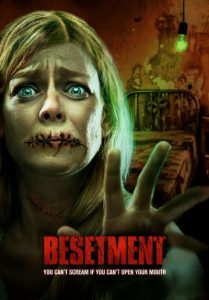 I reviewed the indie horror movie Besetment at The Slaughtered Bird:
I reviewed the indie horror movie Besetment at The Slaughtered Bird:
The title of the indie horror flick BESETMENT brings to mind French existentialist films from the 1960’s: long, dreary, bloodless affairs that only people who are paid to like them can say anything nice about. Indeed, whenever I see the title myself I pronounce it “bay-set-MON” in my head to give it that soupcon of elegance.
Does the title promise something extraordinary? Only one way to find out!







September 1, 2017
The Armageddon Glossary
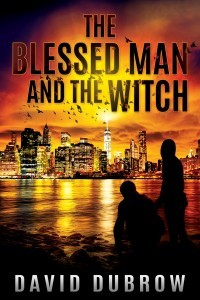 I loved Stephen R Donaldson’s The Chronicles of Thomas Covenant series of fantasy novels as a teenager. As a nominal adult, I find that they still hold up, including the final tetralogy. Outside of the writing style, theme, and narrative, one thing that struck me about the books was Donaldson’s glossary, as well as the synopsis of the previous novels. Not that the inclusion of either of those things was at all revolutionary, but they were helpful.
I loved Stephen R Donaldson’s The Chronicles of Thomas Covenant series of fantasy novels as a teenager. As a nominal adult, I find that they still hold up, including the final tetralogy. Outside of the writing style, theme, and narrative, one thing that struck me about the books was Donaldson’s glossary, as well as the synopsis of the previous novels. Not that the inclusion of either of those things was at all revolutionary, but they were helpful.
In that vein, I’ve added a page to the site under the Free Stories menu titled The Armageddon Series Character List and Glossary. It’s got definitions from Azazel the Watcher to the Higher Plane of Yesod, and everything relevant in between.
You don’t need a glossary to read either The Blessed Man and the Witch or the second book in the series, The Nephilim and the False Prophet. Nevertheless, I include it here for your reading pleasure.










